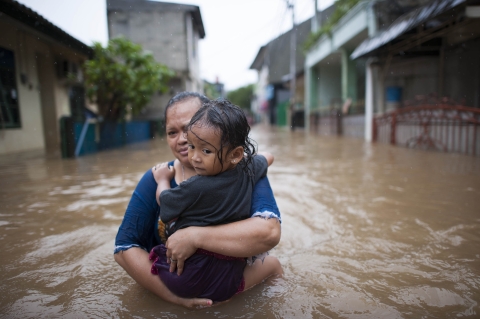
Maryknoll Office for Global Concerns coordinated a letter from 35 different faith groups in a letter to the newly appointed Loss and Damage Fund Board Members who meet for the first time this week. The letter requests that the Fund be accessible, effective, and debt-free; that it consider objectives holistically between economic and non-economic damage; and that plan a long-term strategy to address its true need. Read this letter as a PDF.
Dear Loss and Damage Fund Board Members,
Congratulations on your appointment to the board of the Loss and Damage Fund (LDF). Thank you for accepting this responsibility and significant undertaking. We know that you recognize the urgency of the moment and the magnitude of climate challenges: The LDF’s success is essential in achieving the Paris Agreement, supporting communities on the frontlines of climate change, and building a more peaceful and just world.
We write to you as faith organizations that work on climate action from a practical and moral imperative. A number of the undersigned are providing assistance to men, women, and children suffering from extreme weather events such as droughts, typhoons, and cyclones. They are seeing how people’s physical, financial, natural, social, psychological, spiritual, and human needs are increasingly being unfulfilled due to the impacts of climate change and the resulting loss and damage. We are all motivated by compassion and justice that demands respect for the rights and dignity of all living beings, especially the poor and marginalized. They are having to deal with the effects of a climate crisis that they did not cause.
As the Board begins its work, we call on you to:
- Confirm quickly (no later than June 12th) that the World Bank can host the LDF as a Financial Intermediary Fund as set out in the COP28 decision text. In the case that the World Bank is unable to host the LDF, then the Board needs to act quickly to instruct the Conference of Parties (COP) serving as the meeting of the Parties to the Paris Agreement (CMA) to operationalize the Fund as an independent standalone institution. To this point, transparency must be upheld to ensure trust.
- Ensure that the funding modalities are accessible, effective, and primarily debt-free. Debt repayments are crippling many developing countries and those vulnerable to climate risks. To date, most climate finance has been provided as loans. The LDF should not perpetuate this. A small-grants window must also be established for vulnerable groups to directly receive the urgent funding they desperately need for reconstruction and recovery.
- Consider LDF objectives holistically avoiding the distinction between economic and non-economic losses and damages. People are already losing more than their material possessions due to climate change. They are losing their ancient land, their culture, their ways of life, their faith, their mental health, and their loved ones. Addressing the full scope of loss and damage requires recognizing non-economic losses and damages have tangible economic impacts.
- Prepare a long-term fundraising strategy to ensure that the Fund is well resourced to fulfill its purpose and address the true scale of need. This needs to include specifying the relationship between the LDF and funding arrangements. For transparency, efficiency and effectiveness, it will be critical for the Board to specify how the LDF fund will act as a platform for facilitating coordination between itself and the funding arrangements.
It is our sincere hope that the Board will work collaboratively, efficiently, and effectively to serve the needs of the most vulnerable who are suffering from the climate crisis: especially women, youth, the disabled, the elderly and Indigenous Peoples who are particularly affected by the impacts of the climate crisis.
This fund serves as a beacon of hope and has the potential to make a significant difference in the lives of those most affected.
Sincerely,
Adorers of the Blood of Christ US Region JPIC Office
Anabaptist Climate Collaborative
Benet Hill Monastery
Catholic Climate Covenant
Catholic Relief Services (CRS)
Congregation of St. Joseph, Social & Environmental Justice
Coalition on the Environment and Jewish Life
Dominican Sisters of Houston
Dominican Sisters ~ Grand Rapids
Dominican Sisters of Sinsinawa
The Episcopal Church
Evangelical Lutheran Church in America
Franciscan Action Network
Franciscan Peace Center
Franciscan Sisters of the Sacred Heart
Interfaith Power & Light
Mennonite Central Committee U.S.
Maryknoll Office for Global Concerns
Pax Christi international
NETWORK Lobby for Catholic Social Justice
New Mexico Interfaith Power and Light
Medical Mission Sisters, Justice Office
Office of Peace, Justice, and Ecological Integrity/Sisters of Charity of Saint Elizabeth
School Sisters of Notre Dame-Atlantic-Midwest Province
Sisters of Charity of Nazareth Western Province Leadership
Sisters of Mercy of the Americas Justice Team
Sisters of St. Francis, Clinton, Iowa USA
Sisters of Saint Francis, Rochester MN
Sisters of St. Joseph of Carondelet Albany
Sisters of Saint Joseph of Chestnut Hill, Philadelphia PA
Sisters of St. Joseph of Rochester
Sisters of St. Joseph of Springfield
Unitarian Universalist Service Committee (UUSC)
United Church of Christ
U.S. Federation of the Sisters of St. Joseph
Wheaton Franciscans, JPIC Office
Photo of a mother holding her child in the flooding in Banjir Jakarta in 2017 by Kompas/Hendra A Setyawan (HAS) of the UN World Meteorological Organization via Flickr.
